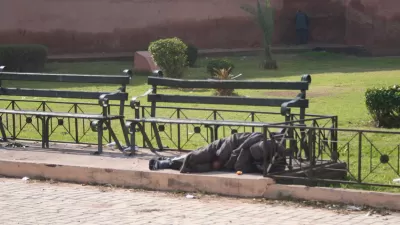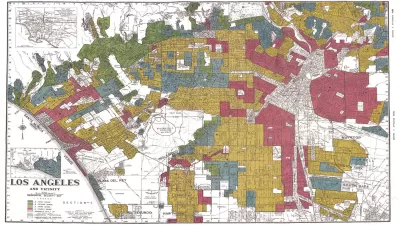A new report by Brookings confirms that “big cities remain more unequal places by income than the rest of the country.” Where is the gap between wealth and poverty the greatest?

Alan Berube provides data of a common thread of inequality among America’s cities—although some cities are worse than others.
The report uses the 95/20 ratio as a statistical metric for inequality, defining the ratio as “the income at which a household earns more than 95 percent of all other households, divided by the income at which a household earns more than only 20 percent of all other households.”
“Across the 50 largest U.S. cities in 2012, the 95/20 ratio was 10.8, compared to 9.1 for the country as a whole. The higher level of inequality in big cities reflects that, compared to national averages, big-city rich households are somewhat richer ($196,000 versus $192,000), and big-city poor households are somewhat poorer ($18,100 versus $21,000),” writes Berube.
“However, some cities are much more unequal than others. The big cities with the highest 95/20 ratios in 2012 were Atlanta, San Francisco, Miami, and Boston.”
FULL STORY: All Cities Are Not Created Unequal

Alabama: Trump Terminates Settlements for Black Communities Harmed By Raw Sewage
Trump deemed the landmark civil rights agreement “illegal DEI and environmental justice policy.”

Study: Maui’s Plan to Convert Vacation Rentals to Long-Term Housing Could Cause Nearly $1 Billion Economic Loss
The plan would reduce visitor accommodation by 25% resulting in 1,900 jobs lost.

Planetizen Federal Action Tracker
A weekly monitor of how Trump’s orders and actions are impacting planners and planning in America.

Waymo Gets Permission to Map SF’s Market Street
If allowed to operate on the traffic-restricted street, Waymo’s autonomous taxis would have a leg up over ride-hailing competitors — and counter the city’s efforts to grow bike and pedestrian on the thoroughfare.

Parklet Symposium Highlights the Success of Shared Spaces
Parklets got a boost during the Covid-19 pandemic, when the concept was translated to outdoor dining programs that offered restaurants a lifeline during the shutdown.

Federal Homelessness Agency Places Entire Staff on Leave
The U.S. Interagency Council on Homelessness is the only federal agency dedicated to preventing and ending homelessness.
Urban Design for Planners 1: Software Tools
This six-course series explores essential urban design concepts using open source software and equips planners with the tools they need to participate fully in the urban design process.
Planning for Universal Design
Learn the tools for implementing Universal Design in planning regulations.
Caltrans
Smith Gee Studio
Institute for Housing and Urban Development Studies (IHS)
City of Grandview
Harvard GSD Executive Education
Toledo-Lucas County Plan Commissions
Salt Lake City
NYU Wagner Graduate School of Public Service





























